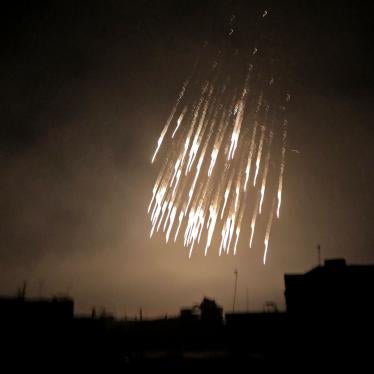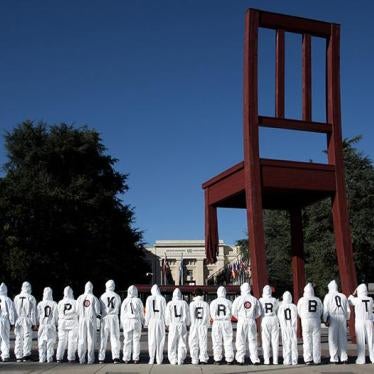Thank you, Chair.
Human Rights Watch has two priorities for this Review Conference: killer robots and incendiary weapons.
Killer Robots
As a co-founder of the Stop Killer Robots campaign, Human Rights Watch supports its call for a new international treaty to maintain meaningful human control over the use of force and prohibit autonomous weapons systems that lack such control.
Only new international law can address the fundamental concerns that autonomous weapons systems raise under international humanitarian and human rights law, ethics, accountability, and security. As our latest report shows, a new treaty would strengthen and clarify existing international law and protect the principles of humanity and dictates of public conscience in the face of emerging weapons technology.
Such a treaty should prohibit weapons systems that by their nature select and engage targets without meaningful human control and ban autonomous weapons systems that target people.
We appreciate the efforts made at the CCW over the past eight years to tackle the concerns raised by autonomous weapons systems, an issue with far-reaching consequences for humanity. But we are dismayed by the failure of last week’s meeting to recommend a mandate for future consideration of this issue. That meeting saw a strong majority of states again express their desire to negotiate a new international treaty. Russia, India, Israel, and the US were the primary blockers preventing a substantive outcome recommending any future regulation.
The decision on what to do on killer robots now rests with this Review Conference. We urge you not to simply roll over the discussion mandate, and meet for two weeks or less in 2022. That’s a wholly inadequate multilateral response, which will diminish the impact of this Review Conference and reflect poorly on the CCW.
Human Rights Watch believes that the codes of conduct and compendiums of best practice proposed during last week’s meeting will only pave the way for widespread development and use of autonomous weapons systems.
The CCW’s “go slow” approach has suited military powers keen to avoid regulation and lock in their technological advantages. The CCW work has not met rising public expectations of regulatory action. Rather, the consensus-based CCW has demonstrated repeatedly that it is incapable of taking the killer robots issue forward.
Therefore, it’s time to move on and build something that’s truly fit for purpose.
Incendiary Weapons
Mr. Chair, the other major issue states should address this week is incendiary weapons, one of the cruelest means of modern warfare. This topic fits squarely within the CCW’s mandate as the subject of one of the convention’s original protocols: Protocol III.
Protocol III regulates the use of incendiary weapons, but has failed to adequately protect civilians from the immediate and lifelong suffering they cause. First, its definition covers weapons that are “primarily designed” to set fires and burn people, but excludes multipurpose munitions, notably those with white phosphorus, that have equally horrific incendiary effects. Second, it prohibits the use of air-dropped incendiary weapons in concentrations of civilians but has weaker regulations for ground-launched ones.
Closing these loopholes would be legally straightforward, but despite the support of a significant number of states, it has proved politically difficult. While the Fifth Review Conference agreed to put Protocol III on the agenda of future meetings, opposition from a small number of states led to the agenda item’s removal two years later.
It is time to shift the focus of the incendiary weapons debate from politics to people and bring fresh voices to the diplomatic table.
A new open letter from more than 50 healthcare professionals, medical-related organizations, and burn survivor groups urges governments to strengthen international law on incendiary weapons. The healthcare professionals come from around the world, and groups representing more than 750 burn survivors have also signed.
Those who have experienced or have treated burn injuries have a unique understanding of the suffering that incendiary weapon victims endure. “As a result,” the letter states, “we know that addressing incendiary weapons at the international level is a humanitarian imperative.”
States at this week’s Review Conference should respond to their call by:
- Condemning the use of incendiary weapons,
- Calling for the loopholes in Protocol III to be closed, and
- Most urgently, ensuring that the Review Conference agree to set aside dedicated time to address the adequacy of Protocol III.
Initiating a process to assess Protocol III would be both a humanitarian step forward and a positive outcome for the Review Conference.
Thank you.








